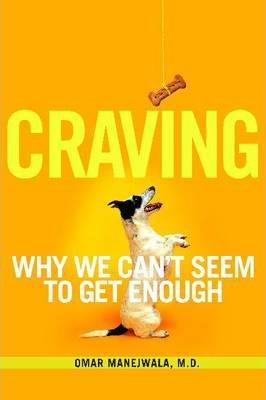Craving: Why We Can't Seem to Get Enough

Craving: Why We Can't Seem to Get Enough
A nationally recognized expert on compulsive behaviors explains the phenomenon of craving and gives us tools to achieve freedom from our seemingly insatiable desires by changing our actions to remap our brains. When we find ourselves wanting something strong enough, we'll do just about anything to get it--sometimes at the expense of our bodies, brains, bank accounts, and relationships. So why do we sometimes have the irrepressible feeling that we need something--such as food, cigarettes, alcohol, or sex--that we really just want? And how do we satiate that feeling without indulging it? In Craving, Omar Manejwala, M.D., translates the neurobiology of this phenomenon into real and accessible terms, explaining why we just can't seem to get enough. He then gives us tools and guidance to find satisfaction without giving in to our cravings. Dr. Manejwala explains: how and why our brain drives behavior; how to change the part of our brain that fuels our cravings; the warning signs that craving is evolving into addiction; why craving is the most difficult component of addiction to address; and why self-help and spiritual groups that use models like the Twelve Steps are so effective at changing behaviors, receiving encouragement, and remaining accountable.
Anxiety or anger about the coronavirus pandemic can enhance our urges to satisfy emotional needs with physical fixes. This resource helps us understand why our brains make our bodies crave, and how to use that information each day. A nationally recognized expert on compulsive behaviors explains the phenomenon of craving and gives us tools to achieve freedom from our seemingly insatiable desires by changing our actions to remap our brains. When we find ourselves wanting something strong enough, we'll do just about anything to get it--sometimes at the expense of our bodies, brains, bank accounts, and relationships. So why do we sometimes have the irrepressible feeling that we need something--such as food, cigarettes, alcohol, or sex--that we really just want? And how do we satiate that feeling without indulging it? In Craving, Omar Manejwala, M.D., translates the neurobiology of this phenomenon into real and accessible terms, explaining why we just can't seem to get enough. He then gives us tools and guidance to find satisfaction without giving in to our cravings. Dr. Manejwala explains: how and why our brain drives behavior; how to change the part of our brain that fuels our cravings; the warning signs t
PRP: 153.50 Lei
Acesta este Prețul Recomandat de Producător. Prețul de vânzare al produsului este afișat mai jos.
138.15Lei
138.15Lei
153.50 LeiLivrare in 2-4 saptamani
Descrierea produsului
A nationally recognized expert on compulsive behaviors explains the phenomenon of craving and gives us tools to achieve freedom from our seemingly insatiable desires by changing our actions to remap our brains. When we find ourselves wanting something strong enough, we'll do just about anything to get it--sometimes at the expense of our bodies, brains, bank accounts, and relationships. So why do we sometimes have the irrepressible feeling that we need something--such as food, cigarettes, alcohol, or sex--that we really just want? And how do we satiate that feeling without indulging it? In Craving, Omar Manejwala, M.D., translates the neurobiology of this phenomenon into real and accessible terms, explaining why we just can't seem to get enough. He then gives us tools and guidance to find satisfaction without giving in to our cravings. Dr. Manejwala explains: how and why our brain drives behavior; how to change the part of our brain that fuels our cravings; the warning signs that craving is evolving into addiction; why craving is the most difficult component of addiction to address; and why self-help and spiritual groups that use models like the Twelve Steps are so effective at changing behaviors, receiving encouragement, and remaining accountable.
Anxiety or anger about the coronavirus pandemic can enhance our urges to satisfy emotional needs with physical fixes. This resource helps us understand why our brains make our bodies crave, and how to use that information each day. A nationally recognized expert on compulsive behaviors explains the phenomenon of craving and gives us tools to achieve freedom from our seemingly insatiable desires by changing our actions to remap our brains. When we find ourselves wanting something strong enough, we'll do just about anything to get it--sometimes at the expense of our bodies, brains, bank accounts, and relationships. So why do we sometimes have the irrepressible feeling that we need something--such as food, cigarettes, alcohol, or sex--that we really just want? And how do we satiate that feeling without indulging it? In Craving, Omar Manejwala, M.D., translates the neurobiology of this phenomenon into real and accessible terms, explaining why we just can't seem to get enough. He then gives us tools and guidance to find satisfaction without giving in to our cravings. Dr. Manejwala explains: how and why our brain drives behavior; how to change the part of our brain that fuels our cravings; the warning signs t
Detaliile produsului










